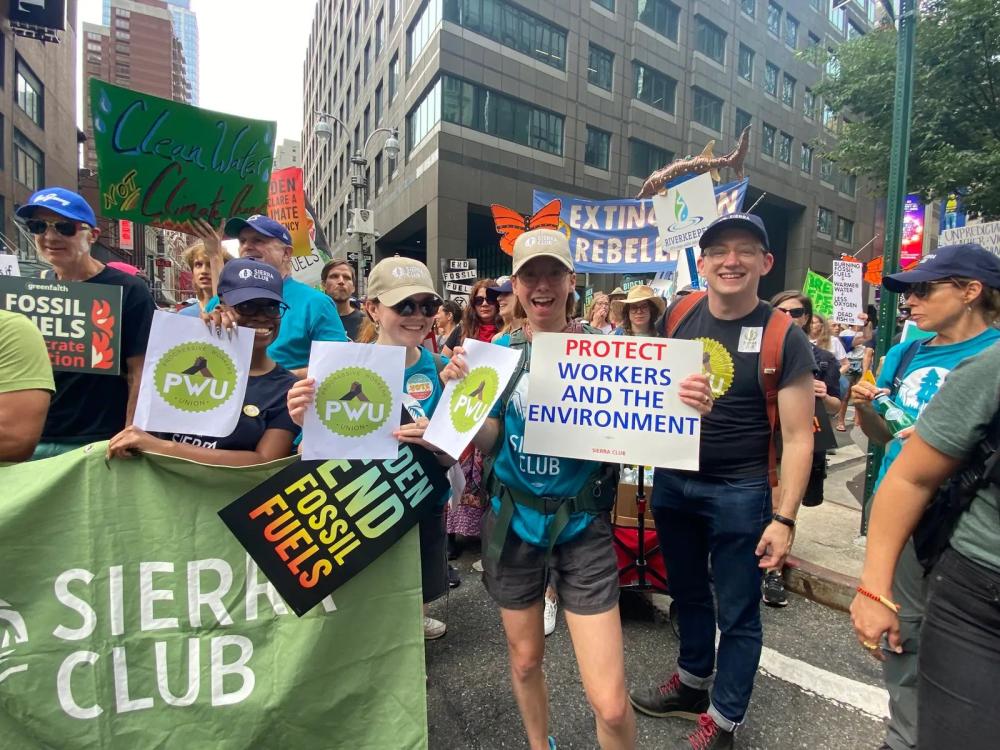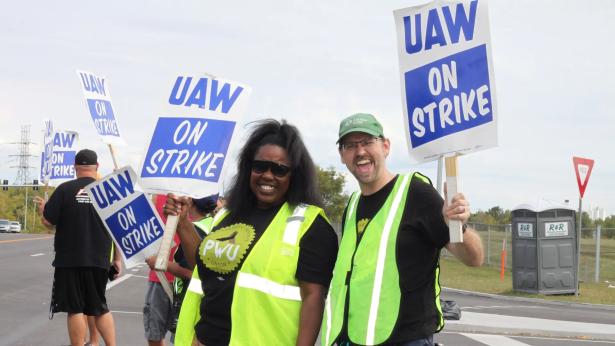As we enter into 2024, it’s hard to think of anything that defined the past year more than the resurgent labor movement, and the significant gains that were won for the working class by a new generation of labor leaders. From the Ford factory floors to the espresso machines at Starbucks, unions turned the tide and won significant gains against entrenched corporations, with young workers often leading the charge. Yet many of the progressive nonprofits who have loudly supported these labor campaigns from the sidelines have been awfully quiet about their own staff unions. So how did these union workers fair among 2023’s huge organized labor wave?
As the President of the Progressive Workers Union, which represents hundreds of staff at five leading environmental organizations, including Sierra Club, 2023 was the most difficult year in memory for our members. Friendly relationships with management across many organizations disintegrated as layoffs, restructuring and management’s approach at the bargaining table drove nonprofit workers — the very same workers who are on the frontlines of the most important political and environmental fights in the nation – to file a slew of grievances alleging widespread contract violations, bad faith bargaining, and retaliation.
No one wins when activists are beaten up and broken down. The role of our members in driving real political and economic solutions to our nation’s crises cannot be understated. For the Progressive Workers Union, our fight is ultimately about ensuring dignified working conditions, fair pay, and sustainable cultures for the people working day in and day out to make the world a more sustainable and equitable place so that they can more effectively accomplish the ambitious goals of our movements. These issues are especially important as progressive nonprofits strive to recruit a more diverse workforce. We cannot possibly hope to build an intergenerational, multi-racial coalition if our organizations are unwilling to work with unions to ensure living wages.
Our organizations have been on the cutting edge of the fight to ensure safe working conditions, address racial justice, protect the environment, and defend our collective future. We shut down fossil fuel projects while demanding a just transition for workers, promote equitable energy policies, protect endangered species and lands, and advocate for progressive climate solutions at the local and national level.
So why are some executives at the head of these critical institutions laying off their staff, actively fighting their unions and failing to live up to the organization’s publicly promoted values? We’ve heard the same thing time and time again: nonprofits face a funding slump, positions must be cut, and the remaining workers need to tighten their belts and be grateful to keep their jobs.
Nonprofit bosses are certain we can solve complex problems like income inequality and steer the transition to renewable energy, but when it comes to figuring out how to protect their own workers and ensure pay equity, they are unable, or unwilling, to act. They deflect their own responsibility for their organization’s financial woes, and instead look to blame staff unions like PWU.
Take for example the Sierra Club. The organization’s leadership faces mounting charges and allegations of violating the contract and delaying bargaining by not offering written counter proposals in a timely manner, threatening union leaders with termination, and taking steps to restrict union organizing. Meanwhile, executive director Ben Jealous leapt at the opportunity to stand in solidarity with the United Auto Workers (UAW) in their Stand Up Strike. Even while Jealous was tweeting out his support of UAW and walking the picket line, he continued to say the union’s activities were costing the company financially, both in the media and in internal all-staff emails, reportedly calling union leaders liars while simultaneously promising that Sierra Club will work towards a goal of being the “most progressive employer in the movement.”
In response to his promise of a cutting-edge contract, PWU brought forward several proposals to the bargaining table, including echoing UAW’s push for a four-day work week, a policy overwhelmingly popular with Gen Z and Millennial workers. Just days ago, over 100 elected officials, unions, and organizations across the country, including the UAW and U.S. Rep Rashida Tlaib (D-MI), submitted letters in support of our efforts.

Thus far, management has rejected outright most of PWU's major, substantive proposals. All the while, they have repeatedly put forward proposals to roll back hard-won benefits and worker protections including undermining the progressive discipline process, eliminating future across the board raises by tying them to specific criteria including performance evaluation and revenue generation, and removing key lay off protections.
It doesn’t have to be this way.
Whether at Sierra Club, or any other organization, nonprofit executives have an opportunity to stand in true solidarity with organized labor across the country by collaborating with their unions to write and ratify groundbreaking contracts that set the bar for all workplaces.
To fulfill the missions they loudly and proudly promote to the world, nonprofits must first behave with respect and honesty toward the people on the front lines of their work. They can’t support an effective labor movement against runaway capitalism and climate change if they don’t try to clean up their own houses first. Nonprofit leaders have a unique opportunity to work with unions like PWU to build on the labor movement’s momentum in 2023, and to ensure that 2024 is another landmark year in the fight for worker and environmental justice.
We’re waiting.
(In an email to Teen Vogue, Sierra Club denied the allegations put forth by PWU as well as disputed the characterizations of the company’s proposals.)
Cecilia (CJ) Garcia-Linz (she/her) is serving a second term as President of Progressive Workers Union and is an employee with the Sierra Club's Michigan Chapter. She has served as a Sierra Club Chapter Unit Rep and was a member of the bargaining team negotiating the Sierra Club Chapter Unit’s first CBA. She’s a mom, grandma, activist, chef, artist, rescue pet mom, and youth sports coach. CJ is committed to equity, justice for all, human rights, food sovereignty and security, environmental conservation, and abolishing the police and systems of incarceration.
Teen Vogue is the young person’s guide to conquering (and saving) the world. We are the leading brand dedicated to amplifying the voice of young people on the issues they care about the most, across culture, fashion, politics, beauty, identity/wellness, and more.
At Teen Vogue, we pride ourselves on publishing reported pieces and essays that are inclusive and disruptive. With smart, authentic takes on culture, identity, and politics, we tell the stories that normally go untold, defining the zeitgeist for a new generation that demands style and substance. As our Editor-in-Chief Versha Sharma says, we aim to be a “guide and resource for young people who want to change the world for the better, all the while reminding them to have fun and find joy doing it.”
Stay up-to-date with the politics team. Sign up for the Teen Vogue Take


Spread the word